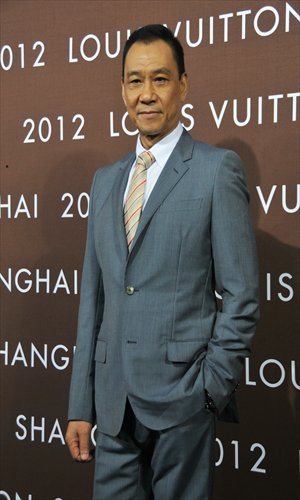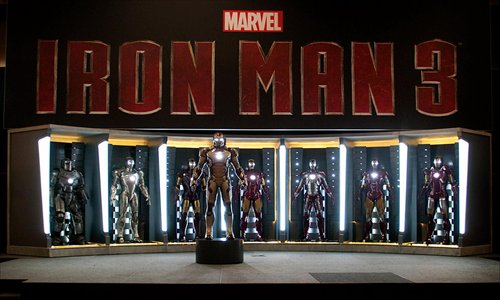Hollywood&China


Photo: CFP
Since Chinese mainland actor Wang Xueqi is the only actor set to appear in Iron Man 3, industry insiders are wondering whether the film will maintain its label as a "co-produced" film.
This is due to recent decisions made by Chinese authorities at the end of last month. The criteria for Hollywood films that meet the US-China "co-production" standard will be raised.
As a result, many Hollywood blockbusters, such as Looper, Cloud Atlas and The Expendables 2, are being challenged for their "co-production" label.
'Iron Man 3'
Seeing domestic actors and actresses in Hollywood blockbusters often excites Chinese audience.
So when Disney, Marvel Studio and DMG announced in April that Iron Man 3 will be a co-production between the US and China, rumors over the actors and actresses involved surfaced.
Hong Kong actor Andy Lau, mainland actor Wu Xiubo and actresses Yang Mi and Fan Bingbing were all speculated to have roles in the film.
Last week, information was released that Wang Xueqi, 66, would be a Chinese actor in Iron Man 3, as he was seen talking with Dan Mintz, producer of Iron Man 3.
Wang is set to play Chen Lu, a scientist who later becomes the Radioactive Man. A woman surnamed Zhao, an assistant of Wang, told Beijing Times newspaper that Wang met Mintz to discuss roles in Iron Man 3. Final decisions have not been confirmed.
August, West China City Daily reported that the crew would shoot in places like Beijing and Shanghai this September.
Shanghai Evening Post reported that three elements must be fulfilled in order for a film to be counted as a co-production: One-third of the investment must come from China, a Chinese actor or actress must play a major role, and major scenes must be shot domestically.
Industry insiders are wondering thus if Iron Man 3 meets the requirements, since Chinese company DMG has invested in the film, Radioactive Man is an important figure in the comic book and scenes will be shot in China.
"One thing we need to take into consideration is the amount of investment," Wang Siwei, a film critic, said in a phone interview with the Global Times.
"Such a big budget Hollywood film needs an investment of over $200 million. One third of that is $80 million, or 500 million yuan. For Chinese investors, this is an extreme number."
"Domestic investors must consider their economic return as well," said Wang.
The investment required prevents Chinese companies from participating in many Hollywood works.
Though Radioactive Man is a major role in the comic book Iron Man, possible changes may take place in the film version. As casting has not been finished, these aspects are purely speculative.
Identity issues
Early this year, a new deal between China and the US increased the quota of imported Hollywood works from 20 to 34 and raised the share American companies can receive from the box office revenue in China from 13 to 25 percent.
This bodes well for foreign flicks, but the most attractive option for American productions is to be labeled as a "China-US co-production film," as a co-production will not be included in the quota and will likely have a higher box office share.
Some worry that such films will harm domestic products.
In a seminar on films late last month, Zhang Pimin, deputy director of State Administration of Radio, Film and Television, said that many films wearing the "co-production" label don't really qualify as a co-production.
But this label generates high ticket sales and occupies space otherwise taken by domestic films, according to Zhang's statement published on the Beijing News.
On the contrary, films with Chinese elements often do not perform well in foreign markets.
Terence Chang, producer of Red Cliff, told Legal Mirror that he was planning a film about American pilots in China.
When he gave the scripts to US filmmakers, they said an American audience would be disinterested in seeing a film with so many Chinese people in it.
The Flowers of War is another example. Though Christian Bale is the leading actor, compared to the 600 million yuan it grossed at the domestic box office, American audiences were much less interested.